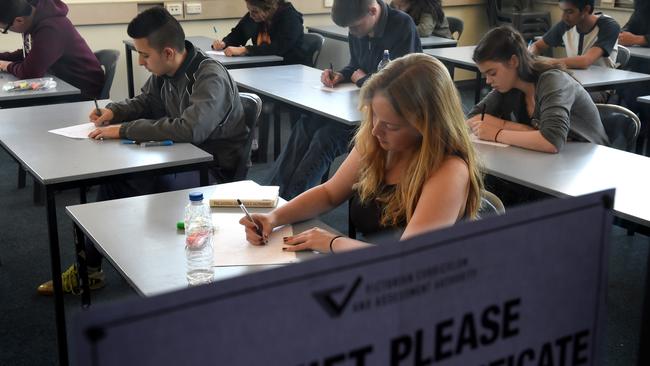VCE English exam 2022: teachers, tutors and examiners share their tips on how blitz the 3-hour exam
Top students, teachers and tutors share their best tips, dos and don’t to blitz the VCE English exam.
Education
Don't miss out on the headlines from Education. Followed categories will be added to My News.
More than 50,000 Victorian students are studying ahead of their first big VCE English exam on October 26.
The Herald Sun has compiled a list of the top advice, predictions and tips from examiners, leading English teachers and tutors to help students across the state get the best marks possible.
The 2022 English exam will be three hours plus 15 minutes reading time.
It will consist of three sections worth 20 marks each, which should take an hour each to complete.
Top English student
A 50-score student in English wants you to do this one thing to boost your VCE English exam score.
Rion Ahl received 50 in English, got a 99.95 ATAR and is co-founder of 50Coach. Here are his tips for the exam.
Rion suggests you do section C first. “It’s tempting to start with Section A but you’ll
probably spend the bulk of your reading time on Section C. As such, we recommend you start with Section C while it’s in the front of mind and do C-A-B (sections),” he said.

In terms of timing, Rion said allocating one hour to each essay may not work. “Comparative will likely take longer than text response. My timing was 50 minutes Section C, 60 minutes
Section A, 70 minutes Section B but consider your unique circumstances in deciding what works for you,” he said.
Rion said students will get marked down for:
-Having too-long quotes that don’t fit well with the flow of the sentence – instead have lots of 2–3-word quotes.
-Not having a clear structure – make sure you know exactly what each sentence in your essay adds to its overall purpose.
-Lack of analysis – don’t retell the story but rather tell a new story through connotations, literary devices and word analysis of the quotes you are using.
-Focusing on only a few characters in a whole essay – show everything you know!
Rion said English is the subject that will matter the most to your ATAR. Here are some more suggestions from him.
Focus on tasks rather than on time.
“Instead of allocating 30 minutes or an hour to studying English, set yourself a goal of writing one essay, memorising a certain number of quotes or having a feedback session with your teacher. With English, it is so easy to spend time on tasks that aren’t directly improving your exam writing skills so having that focus is key,” he said.
Knowing your texts is great, but just as important is refining your structure.
In a timed exam as pressured as the English exam, it is a clear and defined structure that will see you through. Focus on sentence flows and how your body paragraphs are built – especially for argument analysis where technique is all you can bring in with you.
Rion is the co-founder of 50Coach which delivers live online tutoring classes taught by only those who got a raw 50 in the subject for just $20 an hour.

Carolyn Joubran, head of English at Strathcona Girls’ Grammar, has these tips to help you tackle each section.
Section A
Examiners are looking for your knowledge and understanding of the text.
It’s time to revisit the text – you can always tell students who haven’t read the texts.
You need to unpack the meaning of content in the text and show depth of thought.
The examiners will be looking for the meaning or message contained in the central ideas of the book, not just a summary of the events.
Section B
The key word here is comparative. Look at not only where the texts are different but also where they are similar. A high-scoring response will have connected comparisons throughout each paragraph.
Open with a big idea – a conceptual statement – and then state how each text is relevant to the question. Make sure you answer the question using key words from the topic throughout the essay. Create a comparative language bank to draw on – e.g. in comparison, similarly, diverging from etc.
Section C
Have a look at what types of text were given in the last four or five years to what texts to prepare for. Make sure you read and annotate the text during the reading time. Give
yourself 60 minutes to write an answer.
Remember to think about the audience of the pieces and their context and look at all the information, not just what’s in the text box.
Don’t overlook the image. There will be some visual material so look at the metalanguage such as the type of image.
Here’s some more tips and tricks from top teachers and examiners.
Section A
Past examiners have compiled this advice for getting the best marks in Section A.
TIP 1: Present an argument, not examples. The best responses were from those who understood the need to present an argument.
They discussed a sequence of ideas in response to the question, rather than simply offering a series of examples to illustrate a contention.
TIP 2: Carefully consider each word of the topic
Students needed to consider the wording of the topic in order to understand its exact focus.
It is vital that students read the question carefully and address it explicitly, rather than writing a general response about a concept.
TIP 3: Leave the best till last
High-scoring responses were able to resolve the tensions within the topic in their
conclusion. While some students tackled this in the introduction and others throughout the essay, the conclusion was often where students could demonstrate their sophisticated
reading of both text and topic.
Dr Selina Samuels says:
Dr Selina Samuels, chief learning officer at Cluey Learning, a national tutoring company,
said the key to doing well on section A is to know the text very well.
“You need to understand the choices the writers have made and think about the impact of
these choices on the reader. It’s not just about the techniques but the impact of the techniques on the reader. Consider what it does for the reader,” she said.
Dr Samuels said it’s okay for students to have a perspective and to express an opinion about the text or texts.
“Students who have an opinion, or express their feelings about the texts, do better,” she said. “You need to have a view. This view doesn’t have to be unique – it doesn’t have to be special to you, but can come from the teacher or others.”
“Don’t forget to review what the text is about!”
Section B
Past examiners have compiled this advice for getting the best marks in Section B.
TIP 1: What’s different?
The strongest responses explored differences as well as similarities. The instances to which they referred added ‘meaning’ to the topic, inviting conceptual thinking.
TIP 2: Understand the parameters of the topic Topics should never be viewed as loose prompts, but rather as carefully worded questions that offer clear parameters about what is to be explored, and that need to be fully resolved through careful argument.
TIP 3: Don’t favour one text over another.
It is important that students are encouraged to explore a wide variety of key ideas and issues that are explored in both texts, and to examine how these arise.
Dr Samuels says:
Dr Samuels said it is important to write equally about both texts. “Make sure you don’t write more about one than another,” she said.
“Make sure you know the sequence in which the texts are composed so you know which came first and had an impact on the other.”
She said it was also important to know the context of the text and set them against this context in the answer. “Understand what the relationship is to each other,” she said.
“The best answers are also organised so they compare texts together rather than deal with one text at a time. Sophisticated answers weave the texts together,” Dr Samuels said.
“One of the best things you can do is to re-read the texts. Students who are analysing texts in class can get distance from the text so it’s good to read through the material so it’s fresh in your mind,” she said.
Section C
Past examiners have compiled this advice for getting the best marks in Section C.
TIP 1: Don’t just identify the arguments.
Identification of argument is only the first step in the analysis process, and many students could not move beyond summarising and restating the supporting arguments.
TIP 2: Explain the language techniques.
Labelling continued to be a problem (eg rhetorical questions, statistics, inclusive language) when students failed to explain how these ‘language techniques’ were being used, and what persuasive effect they were intended to have on the audience.
TIP 3: Don’t evaluate the argument.
An element of evaluation crept in where students believed they had to make judgments about the argument. This has no relevance in examination analysis.
Dr Samuels says:
Dr Samuels said most students will be well prepared to analyse persuasive language
techniques.
“But do look for new unseen texts to practise on so you can avoid just listing techniques and concentrate on applying them,” she said.
“One of the texts may be a cartoon or some other form of visual language so make sure you understand the techniques. If you are writing about a cartoon, consider the image and the way it’s presented and where your eye is drawn around the image. Don’t just write about the plot or dialogue or speech bubble. It’s about more than just words,” she said.
“Think about colour and salient features. If you are analysing film don’t just default to dialogue but look at the effects beyond just words.
“If you’re doing film analysis look at shot design and language,” Dr Samuels said.
Here is some additional advice from past examiners and expert teachers for doing well on the whole exam.
Examiners’ tips from the 2021 exam
TIP 1: Be comfortable leaving content out.
Students were very confident about their characters, plot points, key examples and quotations. However, they must learn to judiciously choose textual material that is relevant
to the set question and be brave enough to put the rest aside. Too many Section A and Section B essays were lengthy and dense discussions of the text, but not on the set topic.
TIP 2: It’s about the how and the why.
Students could identify contentions, supporting arguments and relevant language use but did not always demonstrate understanding of how the argument develops and functions, how language is used to persuade and why it is intended to impact on the audience in a particular way.
TIP 3: Legible handwriting
Students need to be aware that assessors can only mark what they can read. They are not permitted to guess or infer meaning, so students can disadvantage themselves by not expressing their ideas in a clear, legible manner.

General tips from Dr Samuels
Dr Samuels suggests you start at the first section of the exam and work your way through it.
“I don’t believe messing around with the exam paper helps and it can take time and be a major distraction,” she said.
“Do your exam preparation using a pen on paper because that’s how you will be writing in the exam”, she recommends. “The markers can only mark you on what you get down on
paper – they can’t guess what’s in your head.”
Dr Samuels said it wasn’t too late to make up ground. “Be familiar with the texts. You can’t trick your marker into thinking you have read the text if you haven’t. Read or re-read the books or rewatch the film,” she said.
She also suggests going back to the syllabus document and look at what you are required to do. “Go in prepared and good luck!”
An English teacher’s tips
Dr Emily Frawley, president of the Victorian Association for the Teaching of English and a government school English teacher said students should re-read the texts, attend revision lectures, complete practice exams and make a poster of key quotes and put it somewhere you will look at every day.
In terms of practice exams, she suggests you should seek feedback on plans before seeking feedback on full essays.
The night before, Dr Frawley suggests you re-read any notes you have made, eat a good dinner and go to bed early.
During the exam, make use of reading time to settle your nerves and plan responses in your head before writing time begins. “Consider writing the question at the top of each page and refer back to it to ensure you haven’t lost sight of the question you’re answering,” she suggests.
“If you are having trouble in the exam, write what you know. Assessors look for what they can reward, they don’t deduct marks. If in doubt, writing something is better than writing nothing,” Dr Frawley said.
Last minute tips from Dr Samuels
-Make sure your handwriting is legible.
-In essays set out the parameters of your answer in the introduction. Use the terminology in the question to explain how you are going to tackle the essay. “The biggest and most important thing is to read the question, and in the essay answer that question — and not some other question that you rather hope it is,” she said.
-When writing the essay write as much as you can and make sure the marker can see you’ve answered the question. “The important thing is to make sure that you’re always answering the question,” she said.
-Don’t worry if you can’t remember the quotes you’ve memorised 100 per cent perfectly.
“The markers aren’t going to penalise you if you got a single word wrong, it doesn’t work that way,” Dr Samuels said. “It’s about demonstrating that you have knowledge of the text which is the most important thing.”




